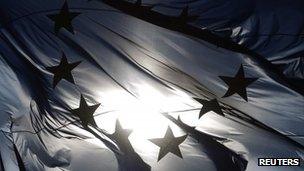Scottish independence: John Swinney rejects EU reapplication reports
- Published
- comments

The Scottish government has insisted an independent Scotland would remain in the EU, despite reports suggesting the country would have to reapply.
Finance Secretary John Swinney told the BBC membership was not in question, but negotiations on detail would be needed.
He spoke after a report in The Scotsman newspaper said the European Commission had confirmed in a letter that a go-alone Scotland would have to reapply.
A referendum on Scottish independence is scheduled for the autumn of 2014.
The European Commission has yet to confirm the details of the letter, which is due to be sent to the House of Lords economic affairs sub committee.
Mr Swinney told BBC Radio Scotland's Good Morning Scotland programme: "When Scotland votes in the referendum in 2014, and assuming there is a yes vote as a result of that referendum, Scotland will still be at that stage a part of the UK, and what we have always accepted is there has to be a negotiation about the details and the terms of Scotland's membership of the EU.
"But crucially that would be taking place at a time when we are still part of the UK, and still part of the EU of which we have been members for 40 years."
An independent Scotland would have to renegotiate membership terms with the EU, the BBC Europe editor Gavin Hewitt reports.
He added that there was an important distinction between Scotland "applying" and "negotiating".
Mr Swinney said it was clear that after becoming independent the country would be negotiating "from within".
The minister believed that any talks on agreeing new terms of membership would be completed by 2016.
But Scottish Secretary Michael Moore believed an independent Scotland would lack clout over EU membership negotiations.
He said: "John Swinney said today that Scotland would have to negotiate the details and terms of Scotland's EU membership. What we really need to know is how they will sort out the Schengen agreement?
"How will they negotiate an opt-out from the Euro? No new member state has joined since 2005 without a clear commitment to join. The Scottish Government cannot wish these problems away."
Lords on the economic sub committee are currently looking at the issue of independence and what impact it would have on Scotland and the rest of the UK.
They wrote to the European Commission asking for guidance on what would happen to an independent Scotland's future membership of the EU.
The BBC understands a reply exists and will be sent within the next week.
A spokesman for President Jose Manuel Barroso said: "President Barroso has been invited to contribute to the House of Lords inquiry on the implications of the economic implications for the United Kingdom of Scottish independence. The president has not yet replied.
"The commission position is well known and set out in the series of responses given to European parliamentary questions. The commission has been very clear that we do not comment on specific situations, but can only give a view in general."
The BBC's Europe editor Gavin Hewitt said: "The EU's position is that a nation becoming an independent state would have to re-apply for EU membership.
"There would be a negotiation which would only start when it was clear what the relationship was between Scotland and London."
The Scotsman writes that it has seen the letter and it says: "If a territory of a member state ceases to be part of that member state because it has become an independent state then the treaties would cease to apply to that territory."
It adds that the correspondence goes on to say that on independence, Scotland would become "a third country" - a technical term for a European state outside the EU which would need to apply to join the 27-member organisation.
Labour peer Lord George Foulkes told the newspaper: "I understand [the President of the European Commission] Jose Manuel Barroso will be replying to the economic affairs sub committee on the economic impact of separation and we have had evidence here in Brussels confirming Scotland would have to seek accession to the European Union."
John Swinney: "What we have always accepted is there has to be a negotiation about the details and the terms of Scotland's membership of the EU."
A spokesman for Deputy First Minister Nicola Sturgeon said the Scottish government was going to write to the European Commission expressing its concerns about the events surrounding the letter which has not yet been sent.
He added: "Serious questions now need to be asked as to where these claims came from and what role members of the House of Lords Committee and the UK political parties played in this fabricated story.
"This incident shows that these Westminster committees and their inquiries are simply anti-independence propaganda tools, and are not seriously considering the opportunities of independence.
"The Scottish government will be writing to the European Commission making clear our serious concerns about this incident."